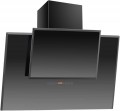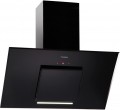Motor power
The power of the hood at maximum speed.
The more powerful the device, the more performant it is, usually. However, there is no rigid dependence here, and hoods of the same power may differ in actual performance. So it is worth evaluating power consumption in terms of power first of all: the lower this indicator, the more economical the device. And when evaluating performance, you need to look not so much at power as at the directly claimed flow of the air (see below).
Flow of air (motor)
The maximum flow of air or motor flow of air indicates the theoretical capability of the device. This parameter of the hood (motor) is measured during idle operation. By connecting the duct and working in the appropriate mode of extraction, the flow of air will be lower. However, high-performance motors will also give a high flow of air in extraction mode.
Max. noise level
The level of noise produced by the hood in the loudest mode of operation. Usually (but not necessarily) it is the maximum power mode. It affects the comfort during operation of the device, so
quiet hoods will be more preferable, but also more expensive.
The decibels in which the noise level is measured are non-linear units, so it is easiest to use comparison tables to estimate a specific value. Here is the simplest table for the values relevant in this case:
— 35 dB. The volume of a conversation in an undertone (but not a whisper). The lowest maximum noise value in modern hoods. Devices with such characteristics are almost guaranteed not to cause inconvenience: such noise is often blocked by other sounds, for example, the background noise of the street in an open window.
— 40 dB. The volume of a normal conversation. The maximum noise level allowed in a residential area during the day. If the hood is bought for home use, and it is supposed to be turned on often and for a long time, the noise level in the selected device shouldn't exceed this indicator.
— 50 dB. Conversation volume at medium tones.
— 60 dB. Raised conversation.
— 70 dB. Sound background on a busy street, in a crowd of people talking loudly, the sound of a vacuum cleaner motor at a distance of 2 – 3 m.
— 75 dB. Scream or loud laughter at a distance of about a metre.
— 78 – 79 dB. Loud mechanical alarm clock, motorcycle o
...r truck engine. The highest level in modern consumer-grade hoods.
Note that the actual comfort of using the device depends not only on the volume but also on the timbre (tonality) of the noise: for example, a low, even rumble is generally perceived easier than high frequencies with clanging notes. If the hood installation is unsuccessful, the actual noise level may be higher than stated in the specifications. For example, additional noise can be caused by the hum of air in the ducts or rattling from the contact of the vibrating body with the wall. However, when choosing, it is worth focusing on the noise level claimed in the specifications.Number of speeds
The number of speeds at which the hood can operate.
The more speeds, the more accurately you can adjust the device's operating mode to a specific situation. At the same time, the vast majority of modern hoods have only three speeds which are enough for most occasions.
Remote control
A remote control allows you to control the functions of the hood from a distance. Such a remote control will be especially convenient for those who, due to low height or health problems, find it difficult to reach for the hood itself every time. At the same time, this function affects the cost of the device, and the need for it arises relatively rarely. Therefore, the presence of a
remote control is typical mainly for rather expensive models.
Sleep timer
A timer that automatically turns off the hood after a predetermined time. With such a system, you do not need to wait until the completion of ventilation and turn off the device manually — just set the timer, and you can safely leave the kitchen on your own business; the hood will turn itself off at the right time.
Smoke sensor (auto-on)
System
of hood automatic start. It is based on a sensor that monitors the presence of kitchen fumes in the air — when a certain concentration of smoke, steam, fat particles is detected in the air, the sensor gives the command to turn on. Such a system not only relieves the user of the need to turn on the device manually but also helps to save energy since the hood turns on only when it is really needed. In addition, not only automatic switching on but also automatic switching off can be provided — after a certain time (most often 5 minutes) after the sensor has ceased to detect pollution in the air.
Display
The hood has its own display. Usually, this is the simplest
LCD screen for two or three characters, sometimes with additional indicators. However, even such a screen makes device control more convenient and visual: it can display the current operating mode, information about the sleep timer (see Sleep timer), the status of filters (see Filter indicator), etc.
This function rarely is used in inexpensive hoods with the simplest functionality. Therefore, the display is usually a sign of an expensive and advanced model.
Height (min)
The minimum height of the entire hood structure is from the lower edge to the upper part of the body (the point of connection of the external air duct). This parameter is indicated only for hoods with an adjustable design that allows you to change the height. Pay special attention to the minimum height if the device is planned to be installed in a kitchen with a low ceiling. In this case, it should be assumed that the optimal height of the air intake above the hob is 60-80 cm, and between the hood body and the ceiling, a headroom is required for the air duct. With a low ceiling, a hood that is too large may simply not fit into your kitchen.

